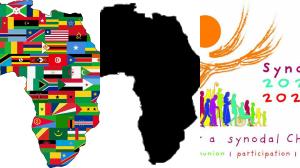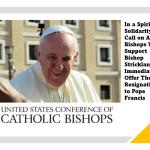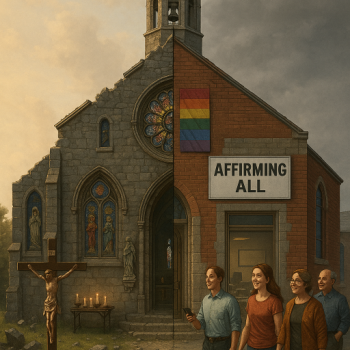As stated, in a previous article in July, “regardless of how the Synod of Synodality turns out, disappointment is the only certain outcome for all involved.” And considering the responses from those hoping for significant change within the Church, the above statement appears prophetic, or at least partially so. Of all the contingents involved, one seemed to exert an uncommonly strong influence over the final document released by Synod of Synodality (SoS). This group, with its strong commitment to Catholic orthodoxy and orthopraxy, represents the future of the global Catholic Church. This group also stands in direct opposition to the pro-sexual liberation/identity political crowd in Western Europe and their allies within the Church.
The group – Catholics from Africa.
These Catholics accomplished something with the final document not seen in the previous three stages of the synod, that is, the exclusion of the letters LBGTQ. The exclusion of these five letters from the final document sent shockwaves throughout progressive Catholic media and advocacy groups and signaled a sea change in global Catholic influence that may well come to fruition in the first pope elected from sub-Saharan Africia.
So, to amend the above observation: regardless of how the Synod of Synodality turns out, disappointment is the only certain outcome for most involved. African Catholics finally have their say and they want nothing to do with the West’s obsession with sexual liberalization and identity politics. Furthermore, many see the imposition of such ideologies on the Church as a continuation of Western colonization.
The Rise of Catholic sub-Saharan Africa
Christianity’s earliest followers were found in Africa; for example, in Egypt, Ethiopia, and Algeria, with St. Augustine himself coming from the latter. However, the most recent growth on the continent now occurs in the South, in sub-Saharan Africa, which now accounts for 16% of global Catholicism. According to Pew Research Center, the Catholic population in the region grew from 1 million in 1910 to over 171 million in 2010. And while the Church continues to shrink in Europe (the West), it continues to flourish in sub-Saharan Africa. Falling birth rates and secularization account for most of the Church’s decline in the West. The Church’s views on sexual morality also factor into this decline. Conversely, sub-Saharan Africa continues to see high birth rates, resistance to securitization, and an acceptance of Catholic moral teaching.
Resistance to the West
Moreover, a month before the First Session, Managing Editor of New Ways Ministries, Robert Shine, expressed hope that the African delegation would not resist their desired changes since it now included “lay people…” Unfortunately for Mr. Shine, those in attendance from sub-Saharan Africa did resist their agenda, lay people and clergy alike. Fr. Thomas Reese of progressive National Catholic Reporter summarized the feelings of those most disappointed by the October synodal document (himself included).
If anything, movement on LGBTQ issues was reversed, as can be seen by the fact that the synod refused to even use the term LGBTQ in their report, even though the Vatican and the Pope now use the term in their documents.
The 40-page report shows that power in the church, at least in the synod, has moved from the Global North (Europe and the United States) to the Global South (especially Africa).
Africans were able to insert into the report pastoral concern for those in polygamous marriages but fought tooth and nail to keep any reference to LGBTQ Catholics out of the report. They were joined by Polish bishops and others in opposition to what they termed “LGBTQ ideology.” [emphasis added]
Clearly, the African delegation (and their allies) flexed their collective muscle to steer the SoS towards a more orthodox position on human sexuality.
What Does the Synthesis Report Say?
While the final document does not mention LGBTQ, it does mention human sexuality, although not in a way Western ideologues preferred. For example, instead of highlighting specific LGBTQ issues themselves, the document lumps sexuality and identity together with “complicated marital situations” and “artificial intelligence.” It goes on to express the following concerning “all” the lumped topics:
Sometimes the anthropological categories we have developed are not able to grasp the complexity of the elements emerging from experience or knowledge in the sciences and require greater precision and further study. It is important to take the time required for this reflection and to invest our best energies in it, without giving in to simplistic judgements that hurt individuals and the Body of the Church. Church teaching already provides a sense of direction on many of these matters, but this teaching evidently still requires translation into pastoral practice. Even where further clarification is required, Jesus’ actions, assimilated in prayer and conversion of heart, show us the way forward.
Moreover, Fr. Reese makes one final observation regarding the document’s intended purpose towards LGBTQ issues. Taken as an offhanded slam at the synod, Fr. Reese laments:
Although this leaves the question open for discussion, the general impression given is, “We have the right answers, we just don’t know how to communicate them.”
Signs of Things to Come…
Aside from one’s views on human sexuality, there appears a consensus forming regarding the final document from the First Session—the power and influence of the African Church on the universal Church as a whole. To quote Fr. Reese again:
…power in the church, at least in the synod, has moved from the Global North (Europe and the United States) to the Global South (especially Africa).
Furthermore, as the Church shifts from North to South, the opportunity for the head of the Church to reflect this reality grows. As the Catholic Herald reported in August of 2022:
The Church itself is now a less European affair as well, with roughly 40 per cent of Catholics in the Caribbean and Latin America, 16 per cent in Sub-Saharan Africa, and 12 per cent in the Asia-Pacific.
With Pope Francis, the Church has its first Latin American pope, although of Italian descent. Given this, the next pope could either come from sub-Saharan Africa or the Asian-Pacific. And, given the results of the First Session of the SoS, it seems as though the former is more likely.
The First Sub-Saharan African Pope
According to the same article from the Catholic Herald above, two current cardinals stand as the front runners for the next pope: Cardinal Robert Sarah of Guinea and Cardinal Peter Turkson of Ghana. However, at 78, Cardinal Sarah falls behind the 73-year-old Cardinal Turkson. What also makes Cardinal Turkson a more ideal candidate (besides coming from the fastest growing Catholic population in the world) is his potential appeal to both conservative and liberal cardinals.
Cardinal Turkson – a tech-savvy polyglot who once played in a funk band – could well reach a growing global Catholic audience. But he is also a staunch conservative who has defended anti-gay legislation. As reported in 2013 by the Associated Press, Archbishop of Cape Coast, Mattias Kobena Nketsiah said that, as a pope, Turkson would be conservative: “You can’t expect him to be the liberal pope people are anticipating”. Yet, Cardinal Turkson’s strong stand on poverty and “idolatry of the market” could also swing liberals behind him. Meanwhile, he played a key role as a peacemaker following Ghana’s 2008 elections.
A multi-lingual, former funk band member, tech-savvy conservative with strong stands on poverty seems the odds-on favorite to assume the role of next pope.
Final Thoughts…
The Synod of Synodality offered an opportunity for those on the margins of the Church to express their views and give voice to their hope for the future of the Church. Many in Catholic (and legacy) media focused on groups often favored by progressives in the West (and North). Unforeseen by many were voices (very theologically conservative voices) of African delegates who universally rejected what they consider the ideological colonization from the West. The influence of these delegates reflects the changing face of Catholicism in the world. Catholics may very well see their first sub-Saharan African pope because of it.
I, for one, welcome it.
Bonus Information
Click here to read how Catholics choose the next pope.
Thank you!
Read The Latin Right’s other writing here.














